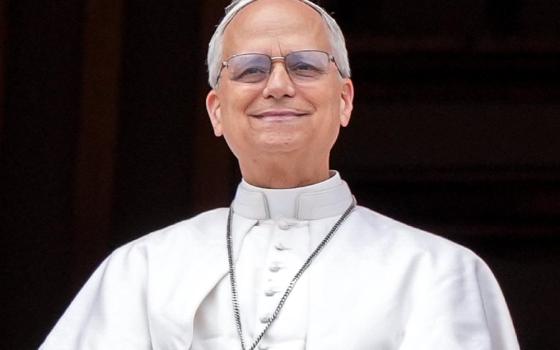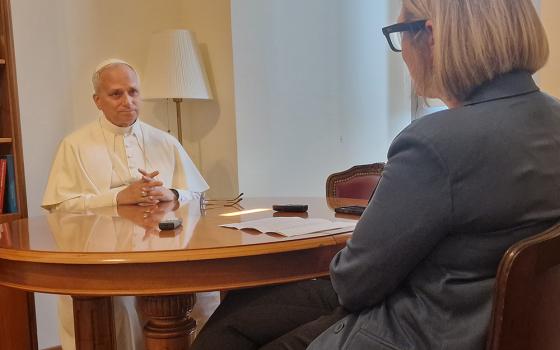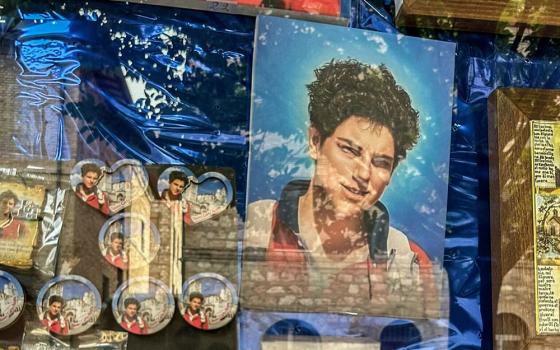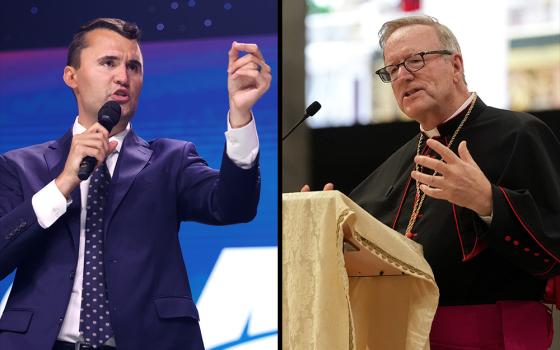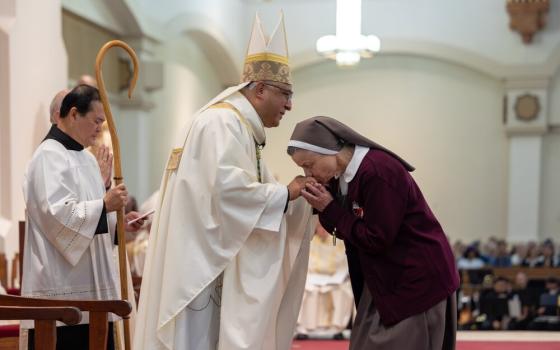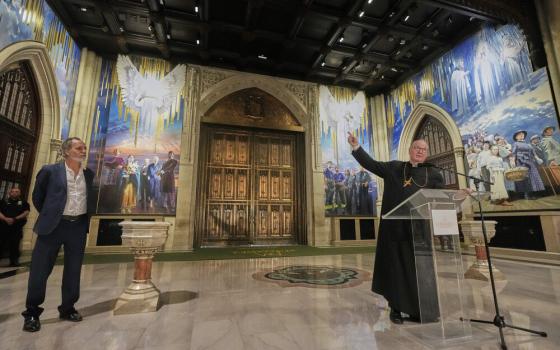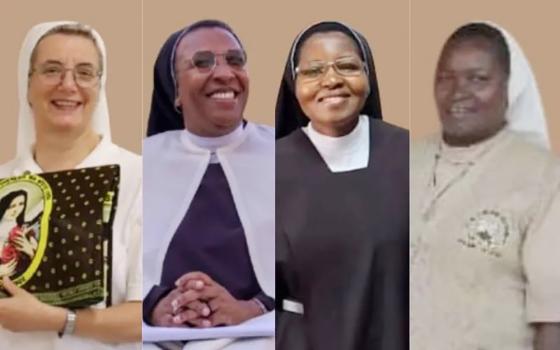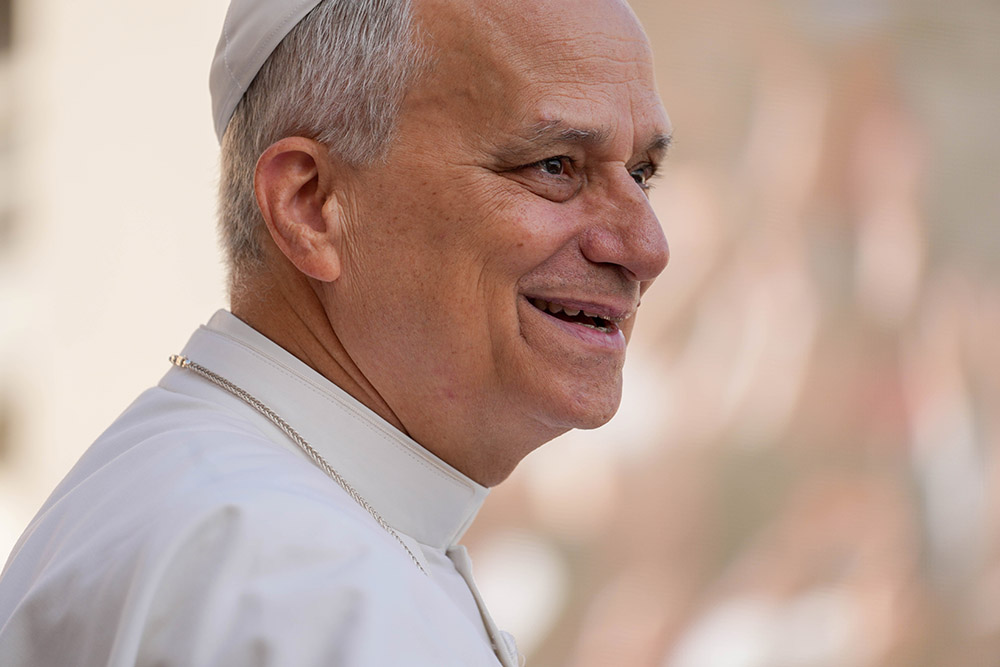
Pope Leo XIV smiles as he greets visitors and pilgrims from the popemobile as he rides around St. Peter's Square at the Vatican before his weekly general audience Sept. 17, 2025. (CNS/Lola Gomez)
Pope Leo XIV's just-released comments embracing his predecessor Pope Francis' hallmark approach to LGBTQ+ Catholics could have a lasting impact on the church because the papal tone on such matters appears to predict priests' attitudes, specifically how U.S. priests approach LGBTQ+ issues, according to a new study.
Those are the findings of Jesuit Fr. Lucas Sharma, whose recently released study found that priests who express approval of Pope Francis' papacy are more likely to adopt a pastoral approach to LGBTQ+ Catholics — even when they are politically conservative, heterosexual or recently ordained.
The study coincides with Leo's comments on LGBTQ+ Catholics in a recent interview for a new book, in which he said he plans to carry forward Pope Francis' hallmark approach to: an open door to all, rooted in dignity and respect, while maintaining church teaching on sexuality and marriage.
Leo said that what "I'm trying to say is what Francis said very clearly when he would say, 'todos, todos, todos.' Everyone's invited in, but I don't invite a person in because they are or are not of any specific identity. I invite a person in because he's a son or daughter of God," Leo told journalist Elise Allen in one of two interviews for a new biography published in cooperation with the pope.
"I think we have to change attitudes before we ever change doctrine," Leo said in video released this week from the July 30 interview.
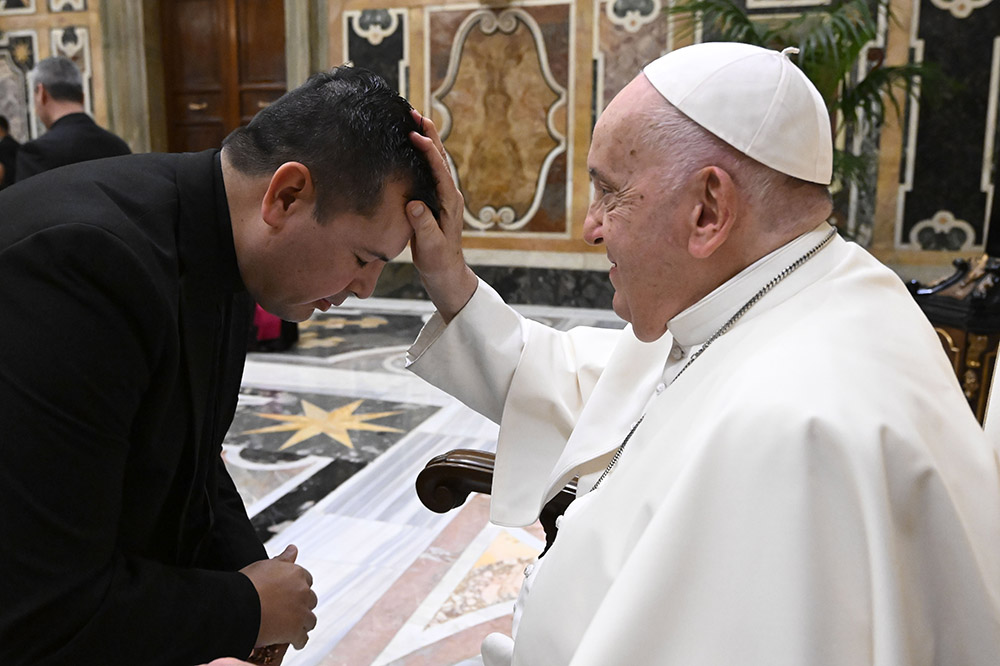
Pope Francis blesses a member of the National Association of Hispanic Priests after a meeting in the Clementine Hall of the Apostolic Palace at the Vatican Nov. 16, 2023. (OSV News/Vatican Media)
Over the past few decades, American society has become steadily more accepting of LGBTQ+ people. Yet within the American Catholic priesthood, attitudes tell a different story. While polls show that only about 21% of American Catholics viewed same-sex relationships as always wrong, priests — especially those ordained more recently — are trending more conservative.
However, the study conducted by Sharma revealed a surprising twist: approval of Pope Francis, rather than ordination date or political ideology, predicts a more pastoral stance toward LGBTQ+ issues, suggesting that even politically conservative and religiously traditional priests can embrace a more inclusive approach when guided by the Francis example.
That raises a new question now echoing in Catholic circles: If enthusiasm for Francis softened priests' views on LGBTQ+ issues, could the same dynamic take hold under Leo? For advocates, the prospect offers hope that a culture of welcome can endure even without doctrinal change, while for researchers like Sharma, it's an open question he said future surveys should try to answer.
Chart on the study included here, story continues below
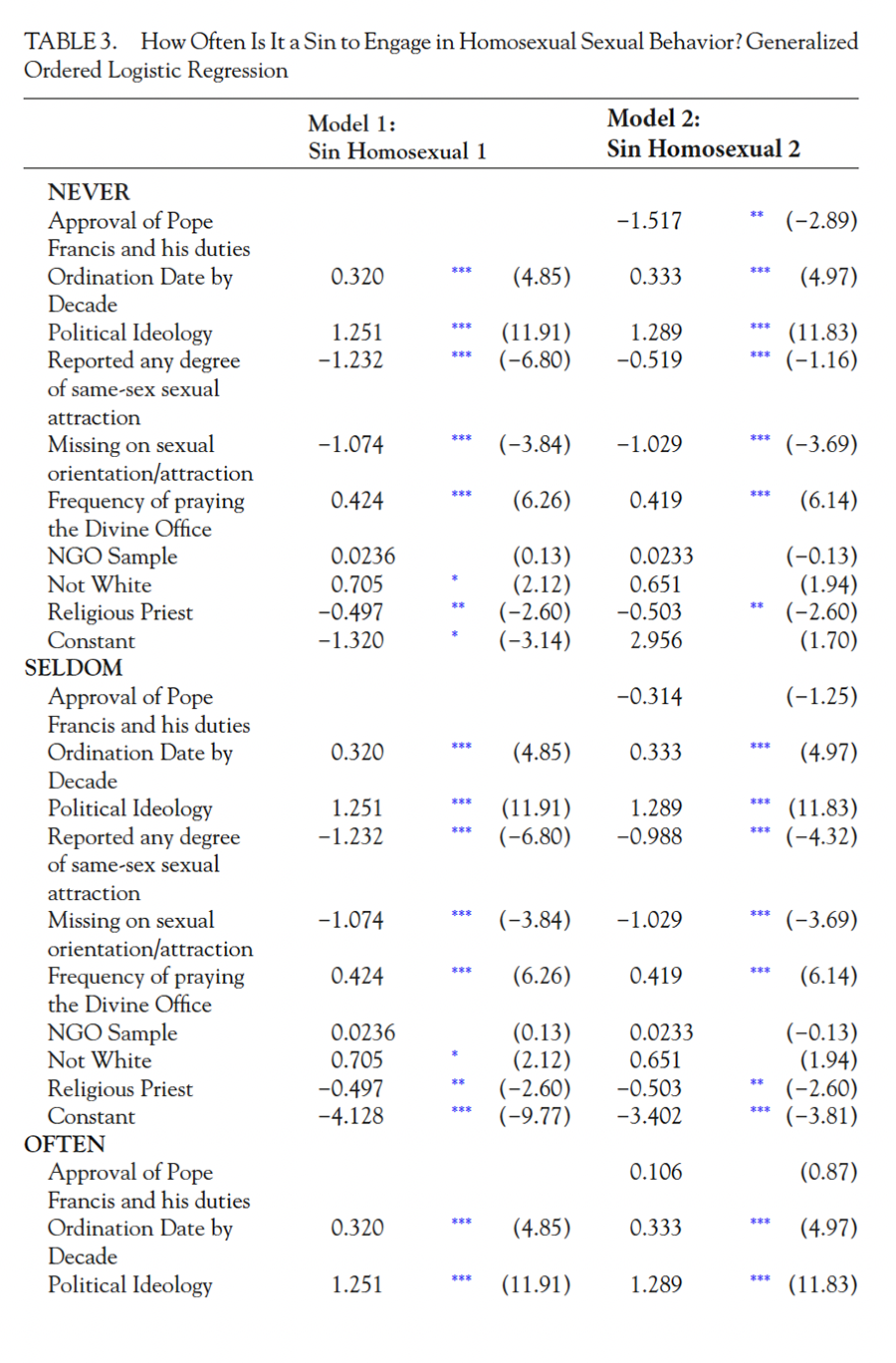
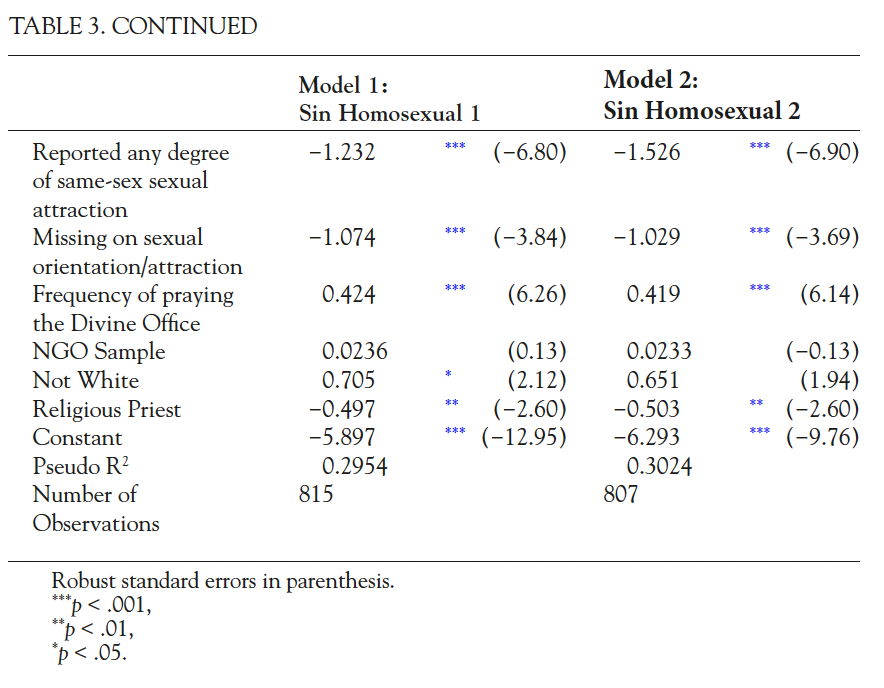
As numbers show in this chart created by Jesuit Fr. Lucas Sharma, younger, more politically conservative, and more traditionally religious priests are more likely to view homosexual sex as sinful — while priests who report same-sex attraction or who did not disclose their orientation are less likely to see it that way. Yet when Sharma added into the analysis the new variable "Approval of Pope Francis and his duties," he discovered a striking pattern: priests who admire him are significantly more likely to say homosexual sex is never sinful, even after accounting for politics, age, and religious practices — suggesting that support for Francis predicts a more pastoral stance beyond other influences. (Graphics by Lucas Sharma)
In the winter of 2023, Sharma said he began delving into a question that had long intrigued him: what shapes American priests' attitudes toward homosexuality? Then a Ph.D. student at UC San Diego and a doctoral fellow at Georgetown University, he turned to a publicly available dataset collected by the Austin Institute between 2020 and 2021.
Sharma, in an interview with the National Catholic Reporter, said he explained that he wanted to understand if priests' personal views, political leanings, or religious practices could predict whether they would embrace or resist a pastoral approach to LGBTQ+ Catholics.
As he analyzed the numbers, a pattern emerged that both surprised and intrigued him. Priests who expressed approval of Pope Francis consistently showed a greater willingness to adopt what Sharma calls a "pastoral approach" on homosexuality.
"If one approves of Pope Francis and his duties, the priests in the study are more likely to be more accommodating on whether they think that homosexual behavior is always a sin, and whether they think that 'men with deep-seated homosexual inclinations' — quoting from the Catechism of the Catholic Church — should qualify for priesthood or not," he said.
Even priests who were politically conservative, heterosexual, or recently ordained reflected this trend – a signal, Sharma said, of what other commentators called the "Francis effect."
Advertisement
Yet surveying priests, Sharma noted, is never straightforward. Questions about sexual orientation remain sensitive, and many priests were understandably cautious about disclosing personal information. In the dataset he used, 271 priests skipped the sexual orientation question entirely among other questions that asked them about their political views and their social and religious habits.
What makes Sharma's study particularly new is that it goes beyond assumptions about liberal or conservative tendencies. While one might expect priests who support Pope Francis to be politically left-leaning and therefore more accommodating on sexual issues, Sharma found the effect persists across political and liturgical lines.
"Even if you identify as a political conservative; even if you appear to be more liturgically traditional; even if you identify as heterosexual; and even if you are more recently ordained, if you approve of Pope Francis, you're more likely to take a pastoral stance on homosexuality," he said.
Joseph Roso, assistant professor of sociology at Ambrose University said he could notice in this study a "covert effect," noting that older cohorts of priests — many ordained in the 1970s or earlier — tended to be more progressive on social issues, sometimes advocating for civil rights and social justice.
Sociologists like Roso point to structural factors that may help explain the conservative tilt among younger priests. Over the past 50 years, he said to NCR, American society has undergone a broad secularization trend. As more liberal, non-religious individuals fall away from the church, the pool of candidates entering the priesthood increasingly consists of more conservative individuals.
"This is not unique to Catholicism," Roso said. "In general, the people who are religious in America tend to be more conservative, and the people who are not religious tend to be more progressive. Fifty years ago, you would find a much higher, higher percentage of religious people who would identify as Democrats than today. I think that's what I suspect is going on, but there could be a number of different factors."
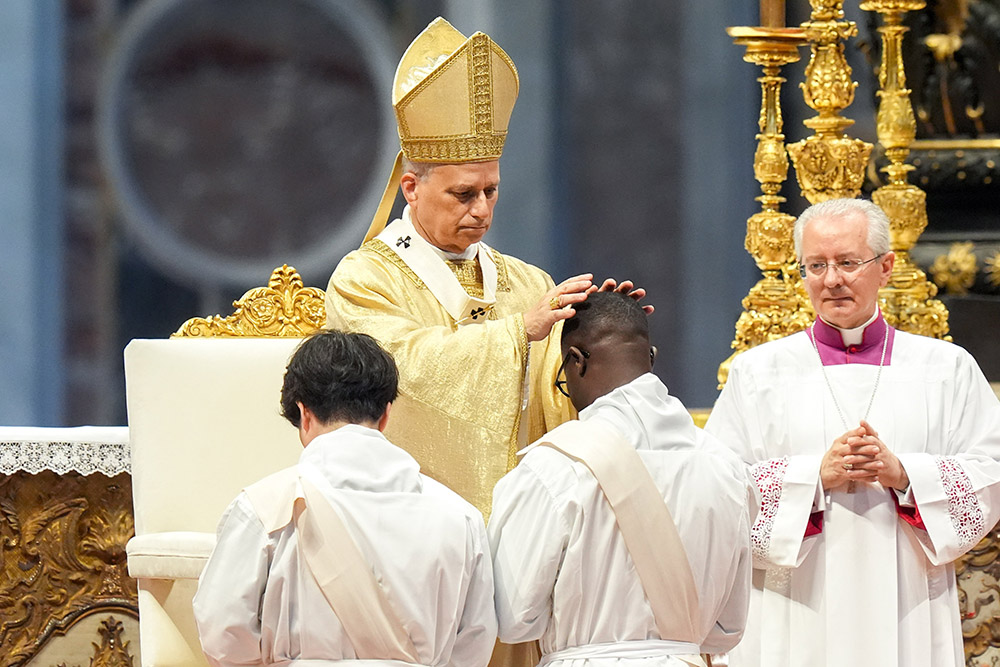
Pope Leo XIV lays hands on an ordinand during Mass on the feast of the Sacred Heart of Jesus in St. Peter’s Basilica at the Vatican June 27, 2025. The pope ordained 32 men from five continents. (CNS/Lola Gomez)
Mentorship and recruitment may reinforce these trends: Conservative priests may influence and attract more conservative aspirants, producing a self-reinforcing cycle, he added.
Yet even amid these structural and demographic factors, exposure to LGBTQ+ individuals appears to matter. Jesuit Fr. James Martin, a longtime advocate for LGBTQ+ Catholics, who recently met with Leo and said the pontiff encourages his ministry, said that experience with LGBTQ+ people can shape understanding and pastoral care.
"I think the more experience you have with LGBTQ people, the more you're able to understand their struggles and their lives," Martin said, talking to NCR from his office in Midtown Manhattan, just a few days back from a rare LGBTQ+ Jubilee pilgrimage in Rome.
Leo's approach in the interview could reflect the former Cardinal Robert Prevost's time as a Vatican official. Martin contrasted the American context with the Vatican, where he said he finds a higher degree of welcome and tolerance for LGBTQ issues. "The surprise for me is that there seems to be more understanding in the Vatican than there is in some dioceses here," Martin said. "At the synod of synodality I found a great deal of welcome and tolerance and support."
Younger American priests often adopt conservative attitudes toward LGBTQ+ inclusion in the church, Martin said.
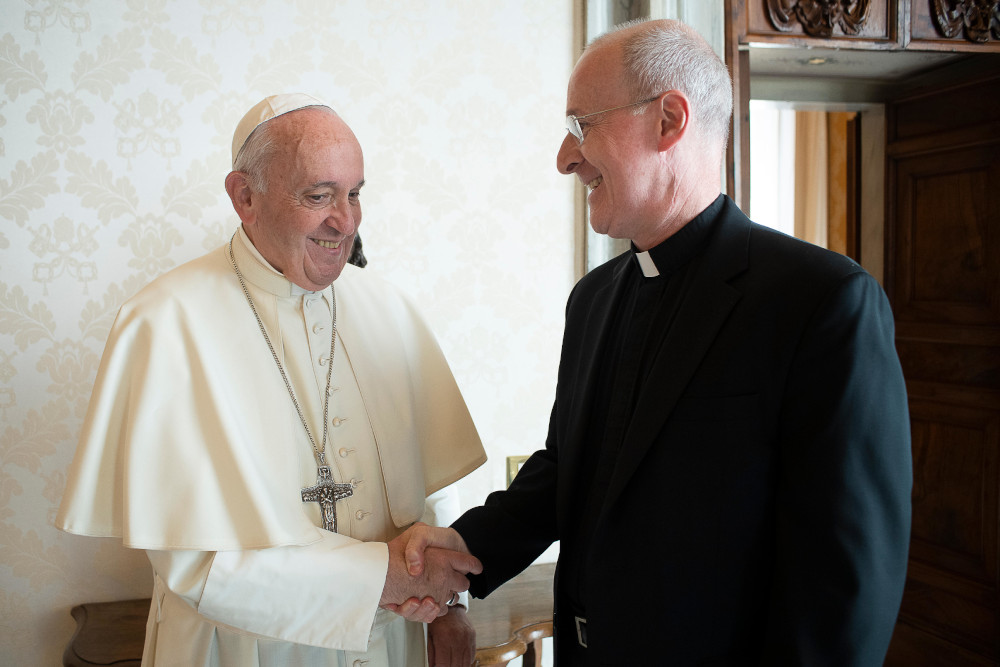
Pope Francis greets Jesuit Fr. James Martin, author and editor at large of America magazine, during a private meeting at the Vatican Sept. 30, 2019. (CNS/Vatican Media)
"These are men that grew up under John Paul II and Benedict, and so they would digest that kind of spirituality," Martin said. "Younger people today are looking for a sense of identity. And the markers that are important for many of these young priests in a sincere way are things that identify them as Catholic."
As more people come out, LGBTQ+ people are just more part of society, the Jesuit founder of Outreach ministry to LGBTQ+ Catholics said.
"What surprises me is that younger priests don't seem to have as much experience with LGBTQ+ people as you would think that they would," Martin said. "The more experience you have with LGBTQ people, the more you're able to understand their struggles and their lives," he said.
The research raises questions about the future of LGBTQ+ inclusion in the American church, Roso said. The conservative trend among younger priests could slow or even reverse the broader societal trend toward acceptance within the church.
"Within the priesthood, as older more progressive priests retire and are replaced by more conservative younger priests, there is a hint that there might be a small reversion," Roso said.
While small shifts in public opinion, particularly among certain political groups, could influence this dynamic, Roso said that these are early signals and far from a complete reversal.
Yet for advocates like Martin, hope remains. "The fact that LGBTQ+ Catholics were able to process through the Holy Door, without protest, I think it's all to the good," he said.
"I think if LGBTQ+ Catholics were hopeful under Francis, they should be hopeful under Leo," he said. "I really trust who Leo is, and I think that he's an open person. Given that he is open to synodality, that means he's also open to listening."
Sharma, at the same time, suggested caution. "Can we say that priests who approve of Pope Leo will take the same approach?" he asked. "I think that's a 'wait and see' question."

